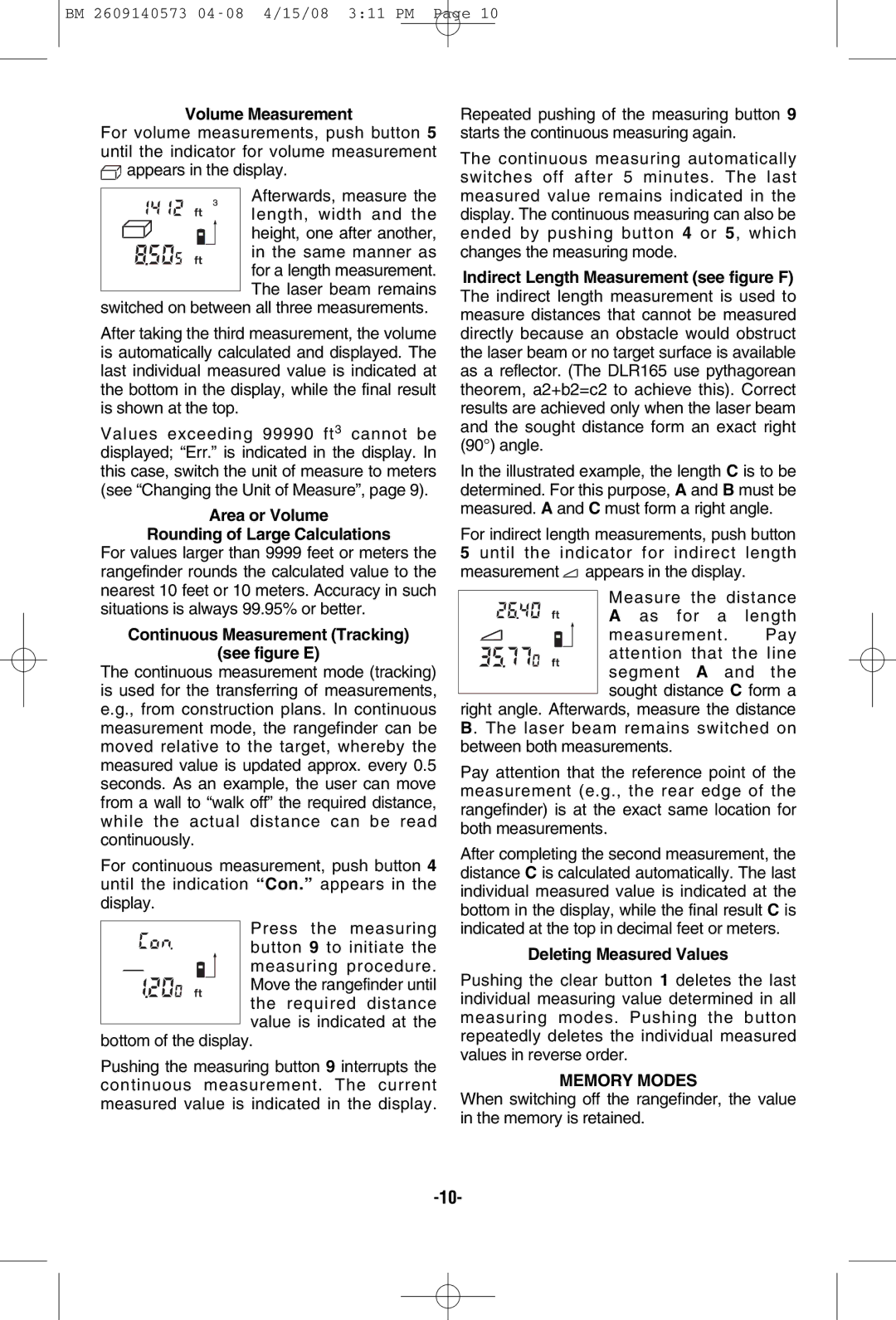
BM 2609140573 04-08 4/15/08 3:11 PM Page 10
Volume Measurement
For volume measurements, push button 5 until the indicator for volume measurement ![]() appears in the display.
appears in the display.
Afterwards, measure the length, width and the height, one after another, in the same manner as for a length measurement.
The laser beam remains switched on between all three measurements.
After taking the third measurement, the volume is automatically calculated and displayed. The last individual measured value is indicated at the bottom in the display, while the final result is shown at the top.
Values exceeding 99990 ft3 cannot be displayed; “Err.” is indicated in the display. In this case, switch the unit of measure to meters (see “Changing the Unit of Measure”, page 9).
Area or Volume
Rounding of Large Calculations
For values larger than 9999 feet or meters the rangefinder rounds the calculated value to the nearest 10 feet or 10 meters. Accuracy in such situations is always 99.95% or better.
Continuous Measurement (Tracking)
(see figure E)
The continuous measurement mode (tracking) is used for the transferring of measurements, e.g., from construction plans. In continuous measurement mode, the rangefinder can be moved relative to the target, whereby the measured value is updated approx. every 0.5 seconds. As an example, the user can move from a wall to “walk off” the required distance, while the actual distance can be read continuously.
For continuous measurement, push button 4 until the indication “Con.” appears in the display.
Press the measuring button 9 to initiate the measuring procedure. Move the rangefinder until the required distance value is indicated at the
bottom of the display.
Pushing the measuring button 9 interrupts the continuous measurement. The current measured value is indicated in the display.
Repeated pushing of the measuring button 9 starts the continuous measuring again.
The continuous measuring automatically switches off after 5 minutes. The last measured value remains indicated in the display. The continuous measuring can also be ended by pushing button 4 or 5, which changes the measuring mode.
Indirect Length Measurement (see figure F) The indirect length measurement is used to measure distances that cannot be measured directly because an obstacle would obstruct the laser beam or no target surface is available as a reflector. (The DLR165 use pythagorean theorem, a2+b2=c2 to achieve this). Correct results are achieved only when the laser beam and the sought distance form an exact right (90°) angle.
In the illustrated example, the length C is to be determined. For this purpose, A and B must be measured. A and C must form a right angle.
For indirect length measurements, push button 5 until the indicator for indirect length measurement ![]() appears in the display.
appears in the display.
Measure the distance A as for a length measurement. Pay attention that the line segment A and the sought distance C form a
right angle. Afterwards, measure the distance B. The laser beam remains switched on between both measurements.
Pay attention that the reference point of the measurement (e.g., the rear edge of the rangefinder) is at the exact same location for both measurements.
After completing the second measurement, the distance C is calculated automatically. The last individual measured value is indicated at the bottom in the display, while the final result C is indicated at the top in decimal feet or meters.
Deleting Measured Values
Pushing the clear button 1 deletes the last individual measuring value determined in all measuring modes. Pushing the button repeatedly deletes the individual measured values in reverse order.
MEMORY MODES
When switching off the rangefinder, the value in the memory is retained.
